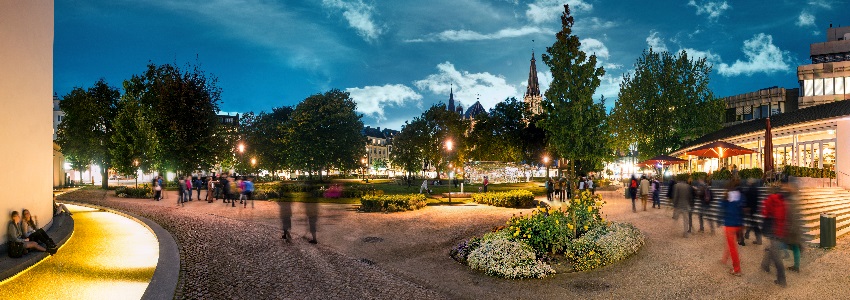Declaration of the Board of Directors of the Society for the Conferring of the International Charlemagne Prize of Aachen on the President of the United States of America, William Jefferson Clinton
 The completion and consolidation of the enlarged European Union, the preservation of peace and security, and peaceful and constructive participation in world politics are based on the community joining Europe and the United States of America.
The completion and consolidation of the enlarged European Union, the preservation of peace and security, and peaceful and constructive participation in world politics are based on the community joining Europe and the United States of America.
After intervening in and decisively influencing the outcome of the two great world conflicts of the first half of the 20th century, the United States of America constituted a foundation for the reconstruction and strengthening of democracy in Europe. After the emergence of the East-West conflict, war-torn Germany and the countries of western Europe ravaged by Nazi aggression were transformed from needy recipients of aid into partners able to cooperate in security policy. The NATO Treaty of 1949 formalized this expectation, simultaneously honoring it with a pledge of support by the USA.
The aim of the United States was to re-establish the Europeans' confidence in their own strength, in their own political future. George Marshall (Charlemagne Prize laureate of 1959) came in the last century to symbolize the values for which the United States performed outstanding service in Europe. The USA supported western Europe in the processes of political, military and economic unification, in particular in the founding of the European Economic Community. Western Europe became an economically important region with a say in world politics.
America steadfastly supported German reunification, especially by working politically to persuade the Soviet Union and the other world powers toward this end, and by the guarantee that Germany would respect the borders in Europe and foster the security treaties in a spirit of integration. America had a decisive share in the expeditious and successful conclusion of the "two-plus-four" negotiations between what were then the two German states and the four victorious and occupying powers of World War II.
The bonds of attachment between Europe and the USA derive their source and strength from the consensus of convictions regarding human dignity, freedom, justice and an open democratic society. In many parts of the world, the example set by America and Europe inspires people to foster and develop their own culture and way of life in a community of democracy and freedom.
The International Charlemagne Prize of Aachen is awarded in the year 2000 to the President of the United States, Bill Clinton, for his special personal contribution to cooperation with the states of Europe, for the preservation of peace, freedom, democracy and human rights in Europe, and for his support of the enlargement of the European Union.
President Bill Clinton is also being honored for his courageous action - including the use of military means - to preserve rules and ethical norms and the rule of law. Bosnia-Herzigovina and Kosovo graphically demonstrate that even as a collective entity the European Union is not sufficiently able to act - at any rate, not without American involvement. He did as much for reconciliation between Greece and Turkey as for a lasting future solution of the Cyprus and Northern Ireland conflicts.
The credit for prospects of a final peace treaty in the Middle East, for which he has done so much over the years, belongs personally to Mr. Clinton.
The Prize also expresses the thanks of the Europeans in general and the German people in particular to the American people for the building up of democracy, freedom and prosperity after 1945, for partnership in NATO, for helping to shape the European Union, for a stable Mediterranean policy, for sustained support in the process of reunification and in settling armed conflicts between the European peoples, cultures and religious groups.
The International Charlemagne Prize of 2000 also pays tribute to the positive, pro-European commitment of some American presidents, secretaries of state and politicians.
Bill Clinton has demonstrated partnership in Europe.
After the fall of the Wall he contributed, by his policy toward a wavering and endangered Russia, to some stabilizing of the domestic situation there. He helped in this way to avert possible conflicts both between the peoples of the former Soviet Union and between the Russians and neighboring European states.
Upon Americans and Europeans living today in an alliance of free peoples devolves special responsibility for a new world order. Winston Churchill (Charlemagne Prize laureate of 1955) once said, "Responsibility is the price of greatness." We know how great is the burden of responsibility that the USA helps to bear in Europe.
Bill Clinton was born on August 19, 1946, in Hope, Arkansas. He was Attorney General of Arkansas, and later its Governor. On January 20, 1993, he was inaugurated as the 42nd President of the United States of America. His indisputable foreign and economic policy successes - as well as his domestic and social policies - contributed to his election in 1996 to a second term as President of the United States.
Bill Clinton has been married since 1975 to Hillary Rodham Clinton. The couple have one daughter, Chelsea.
The Board of Directors of the Society for the Conferring of the International Charlemagne Prize of Aachen honors in the person of the President of the United States a laureate who in difficult and turbulent political times has proved to be a guarantor of the European-American community of values. In this he represents the entire American people.
The impressive history of global responsibility borne by the United States of America in the 20th century is also the foundation upon which are founded the hopes for a corresponding dynamic in the dawning 21st century.




